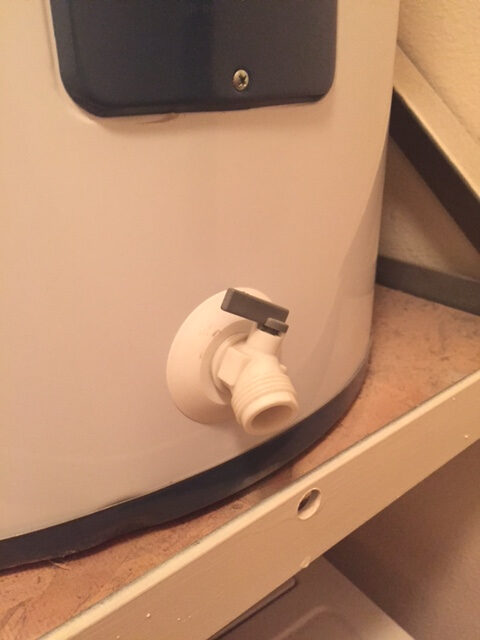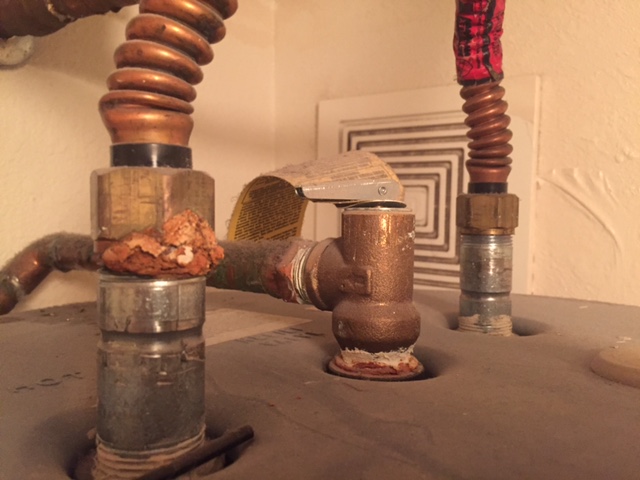Having issues with a leaking water heater? We understand how frustrating that can be, and we’re willing to bet that you want to get to the bottom of why your water heater is leaking (so you can fix it).
If your water heater is leaking, it’s likely because:
- The tank is cracked
- The drain valve has worn out
- The pressure is too high
- The Inlet/Outlet pipe is loose
Let’s look at each of these issues in more detail, so you can get a better idea of why your water heater is leaking, and what you’ll need to do to fix it.
Potential Issue #1: Cracked tank
Unfortunately, if you notice that water is leaking from your water tank, that means your tank is cracked, and the only solution here is to replace your water heater altogether.
Over time, the pressure and heat in a water heater can cause the tank itself to rust and crack, leading to leaks.
If you see your water heater leaking straight from the tank, you’ll need to reach out to a professional to provide you with a quote on a new water heater.
Potential Issue #2: Worn out drain valve

Example of a tank water heater drain valve.
Your water heater has a drain valve, which allows the entire tank to be drained for maintenance or repairs.
If your drain valve is working correctly, it should only “leak” water when it’s opened (during maintenance or while a plumber is there to repair part of your water heater).
However, if you notice this part of your water heater leaking outside of the situations mentioned above, the drain valve itself has probably worn out and will need to be replaced. Over time, valves wear out and won’t properly seal, which can lead to leakage.
If you notice that your drain valve is leaking, you should reach out to a professional. They will be able to replace the drain valve without damaging your water heater tank.
Potential Issue #3: Pressure is too high
If the pressure or temperature in your hot water heater is too high, your water heater’s pressure relief valve will open and discharge some of the heated water.

Your hot water heater’s pressure relief valve is located on the top of the tank and will look something like this
This safety feature helps prevent your water heater from becoming so hot or high in pressure that it explodes.
While the pressure relief valve itself is located at the top of your water heater, it drains water out of your tank via a discharge pipe. So, if you notice:
Water leaking from the pressure relief valve itself, the valve could be loose or broken.

Water leaking from the discharge pipe, it probably means the pressure or temperature of your water heater is too high.
Either way, you’ll want to contact a professional for help. As we mentioned above, if there is too much pressure (or the temperature of the water is too high), your water heater could blow up, which could be dangerous.
If the issue is with your pressure relief valve itself, it could prevent your water heater from releasing hot water, which could also cause your water heater to explode. Either way, we’d suggest reaching out to a plumber as soon as possible.
Potential Issue #4: Loose Inlet/Outlet pipe
Your water heater should have two pipes going into it. One is an inlet pipe, allowing cool water into the tank and the other is an outlet pipe, which pipes the heated water out of your tank and to your appliances/faucets.
However, sometimes the connections can become loose or rust, causing them to leak. If you notice one of these pipes leaking or you notice a pool of water on top of your water heater, this is likely your issue.
Our suggestion would be to try tightening the connections with a wrench. If this doesn’t work, you’ll probably need a plumber to come to diagnose the exact issue and potentially replace part of your inlet or outlet piping.
Want your water heater to stop leaking? Hire the best plumbers in NJ: Air Experts
If you have a leak that you can’t fix on your own, you’ll want to hire a plumber you can trust to accurately diagnose the issue and provide you with a fair repair quote. At Air Experts, we value our customers more than anything, and we’ll never try to upsell an NJ homeowner on a repair they don’t need. If you need more proof, check out our reviews.
